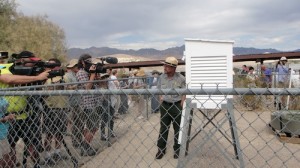A Scorching Anniversary
September – October 2013
Death Valley National Park celebrates 100th anniversary of hottest temperature ever recorded.
 The Furnace Creek Visitor Center Auditorium was filled with weather enthusiasts from across the nation to celebrate the 100th anniversary of the hottest day ever recorded on July 10, 1913. The 134 degree day was penned by Oscar Denton, who took the reading amidst birds falling dead from the sky because of the heat.
The Furnace Creek Visitor Center Auditorium was filled with weather enthusiasts from across the nation to celebrate the 100th anniversary of the hottest day ever recorded on July 10, 1913. The 134 degree day was penned by Oscar Denton, who took the reading amidst birds falling dead from the sky because of the heat.
In conjunction with the National Weather Service from Las Vegas, the Death Valley National Park staff presented topics explaining what makes Death Valley the hottest place on earth, how employees who live in the park survive the summer, and what happened the day of July 10, 1913 to create such hot conditions.
In 2012, a previous record from El Azizia, Libya of 136 degrees was overturned after a thorough investigation by a special committee of the World Meteorological Organization (under the umbrella of the United Nations). Dr. Randy Cerveny, a member of the committee and geography professor at Arizona State University, described the functions and oversight responsibilities of the WMO. Christopher Burt, who writes a weather blog for the Weather Underground, told of his experience in instigating the inquiry after researching some of the dubious circumstances under which the Libyan temperature was recorded.
“I drove all the way from Texas to come here today” shared one participant at the event. “I’ve been tracking Death Valley’s weather for years.” He said when asked how he heard about the celebration.
The National Park Service in Death Valley has partnered with the National Weather Service in support of the Cooperative Observer Program since 1961. This program provides important long term climate data that is used by many to perform scientific studies and provide data for ever improving weather and climate models. The Death Valley station is particularly important due to the extreme weather conditions and remote location. Weather measurements have been taken here since 1911, initially by the Pacific Coast Borax Company then by the National Park Service.
The National Park Service cautions all visitors to take safety measures while visiting the park in extreme temperatures, such as drinking plenty of water and limiting your time outdoors. A June record of 129 degrees was recorded on June 30, 2013, exceeding the previous June record of 128 degrees in 1994.
